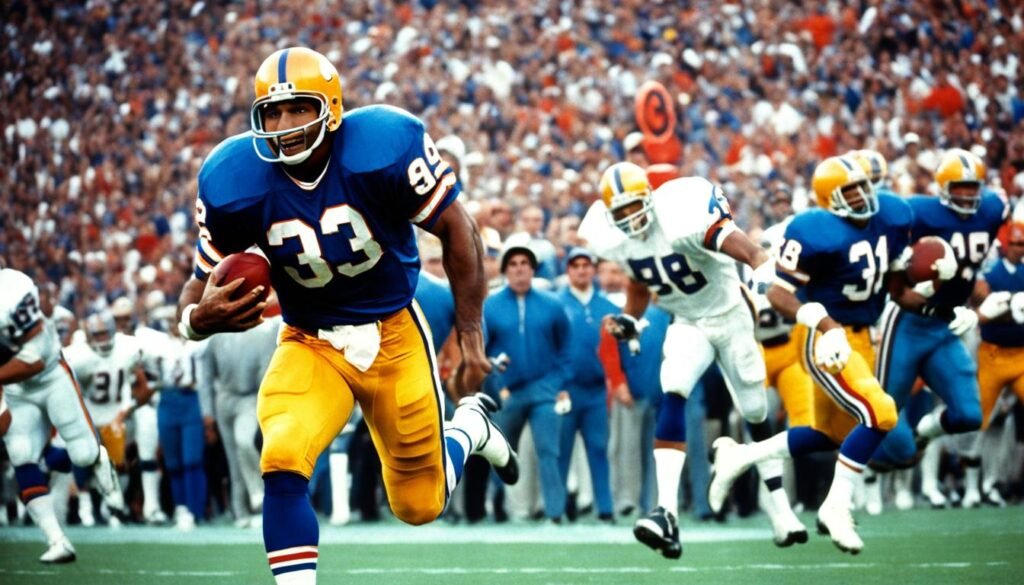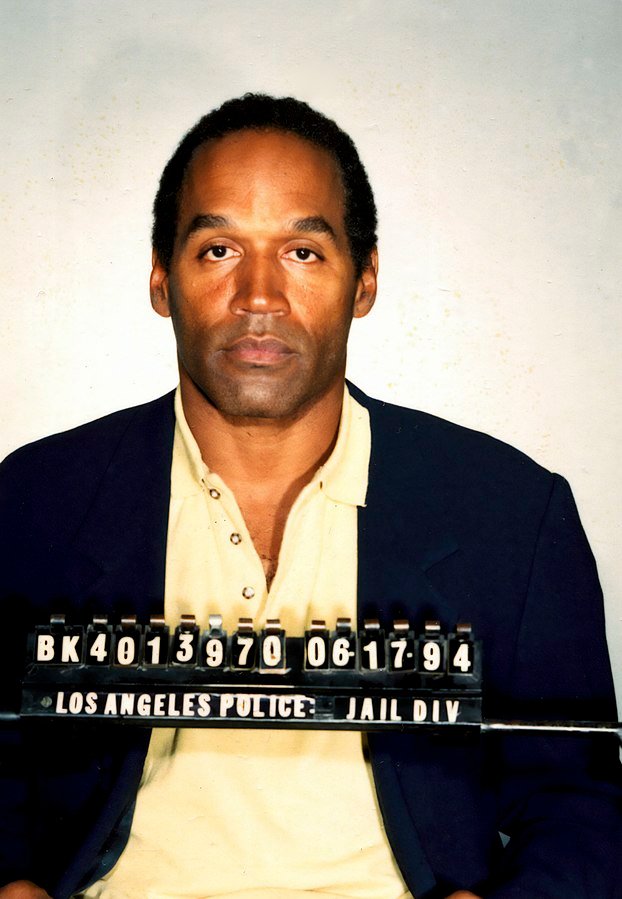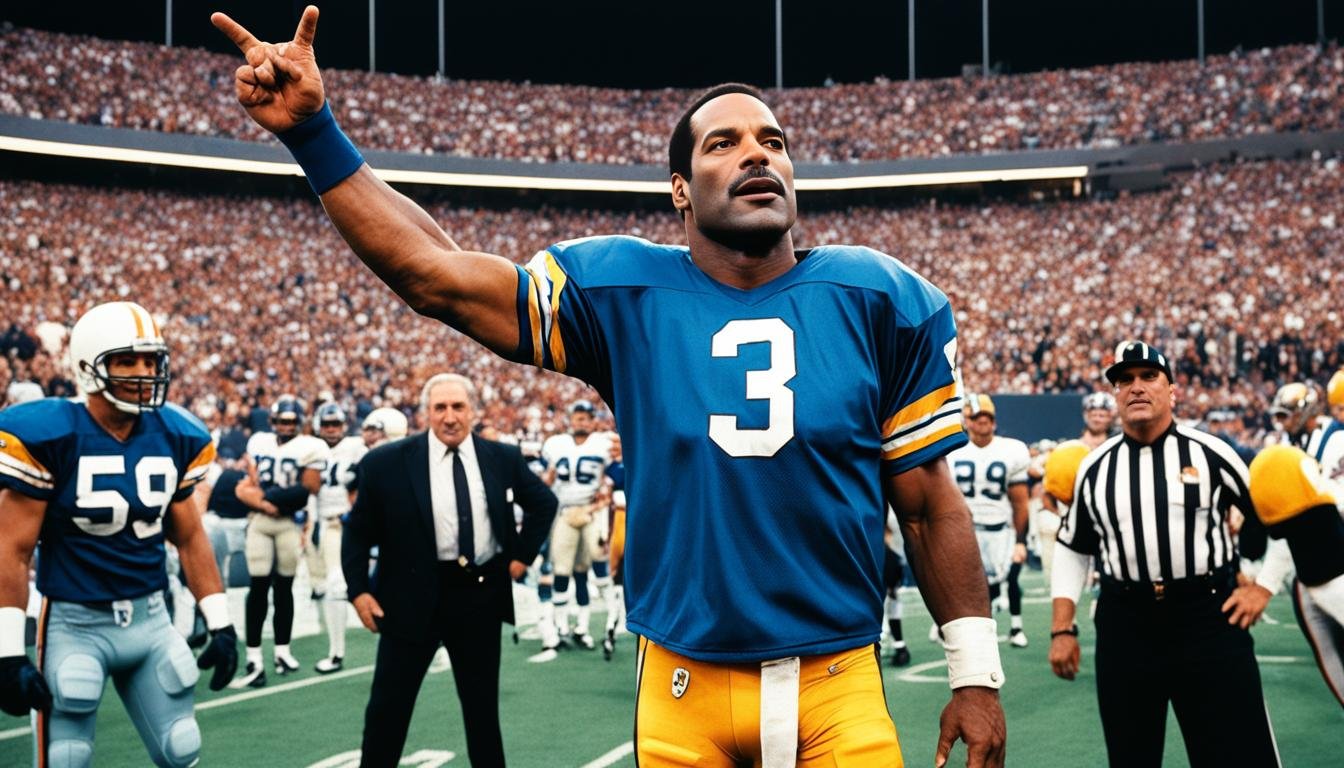O.J. Simpson Biography: Life and Trials
O.J. Simpson Biography
O.J. Simpson, born Orenthal James Simpson, is a former NFL football star, actor, broadcaster, and convicted armed robber and kidnapper. His life has been filled with remarkable successes and shocking controversy. Let’s delve into the fascinating journey of O.J. Simpson’s life, his football career, the infamous murder trial, and the legal troubles that followed.
Key Takeaways:
- O.J. Simpson is a former NFL football star, actor, and commentator.
- He gained national fame as a football player, setting records and winning awards.
- The murder trial of his ex-wife Nicole Brown Simpson and her friend Ronald Goldman captivated the nation.
- Simpson was acquitted in the criminal trial but found liable in the civil trial.
- He faced legal troubles again in 2007, resulting in a conviction for armed robbery and kidnapping.
Early Life
O.J. Simpson’s early life was marked by challenges and adversity. Born on July 9, 1947, in San Francisco, California, Simpson faced physical abnormalities in his legs due to contracting rickets as a child. Despite these obstacles, Simpson’s determination and talent shone through.
Raised by his mother in the tough Potrero Hill district of San Francisco, Simpson’s childhood was far from easy. He found himself drawn into the world of street gangs and became a member of the Persian Warriors during his teenage years.
However, it was in the realm of sports that Simpson truly excelled. Despite his troubled upbringing, Simpson’s athletic abilities were evident from an early age. In high school, his exceptional football talent caught the attention of scouts, which eventually led to a scholarship offer from the prestigious University of Southern California (USC).
In summary, O.J. Simpson’s early life was characterized by setbacks, including health issues, a challenging neighborhood, and involvement in a street gang. However, his remarkable football skills and scholarship opportunity to USC provided a glimmer of hope and a pathway to a brighter future.
Football Career
O.J. Simpson’s football career is widely recognized as one of the most exceptional in the history of the sport. His journey began during his college years at the University of Southern California (USC), where he achieved remarkable success and set multiple records on the football field.
While at USC, Simpson’s talent and dedication propelled him to win the prestigious Heisman Trophy in 1968. This accolade solidified his reputation as one of the most outstanding players of his time.
After his triumphant college career, Simpson was drafted by the Buffalo Bills in the AFL draft. He went on to showcase his exceptional skills as a running back in the National Football League (NFL).
Throughout his tenure with the Buffalo Bills, Simpson consistently demonstrated his prowess on the field, becoming the first player to rush for over 2,000 yards in a single season. His remarkable achievements led him to lead the league in rushing several times, making him a force to be reckoned with in the realm of professional football.
Eventually, Simpson’s remarkable football career came to an end in 1979 when he decided to retire from the sport. His legacy as an exceptional athlete and record-setter still resonates in the annals of NFL history.

How A.I. sees O.J. Playing Football
The Table of O.J. Simpson’s Football Records
| Record | Description |
|---|---|
| First player to rush for over 2,000 yards in a single season | Simpson achieved this milestone in the 1973 NFL season, solidifying his dominance on the field. |
| Multiple league-leading rushing titles | Simpson topped the NFL in rushing yards multiple times during his career, showcasing his exceptional athleticism. |
| Heisman Trophy winner | Simpson’s outstanding performance at USC earned him the prestigious Heisman Trophy in 1968, a testament to his undeniable talent. |
Acting and Commentating Work
After retiring from his successful football career, O.J. Simpson ventured into acting and commentating, showcasing his versatility in the entertainment industry.
Simpson made his mark on the big screen with his roles in movies, most notably the popular “The Naked Gun” series. His charismatic presence and natural comedic timing endeared him to audiences, demonstrating his talent beyond the football field.
Additionally, Simpson gained recognition as a commentator for Monday Night Football and the NFL on NBC. His insightful analysis and engaging commentary provided viewers with unique perspectives on the game.
“Acting allowed me to explore my creative side, and commentating provided a platform to share my love and knowledge of football with fans. It was incredibly fulfilling to entertain and engage audiences in different ways.”
Unfortunately, Simpson’s thriving acting career was cut short following the high-profile murder trial and subsequent legal troubles. Despite the challenges he faced, his contributions to the entertainment industry and sports broadcasting remain a notable part of his legacy.
Movies
During his acting career, O.J. Simpson appeared in various films, showcasing his versatility as an actor. Some of his notable movie roles include:
| Movie Title | Year |
|---|---|
| The Towering Inferno | 1974 |
| The Cassandra Crossing | 1976 |
| The Klansman | 1974 |
| The Naked Gun: From the Files of Police Squad! | 1988 |
| The Naked Gun 2½: The Smell of Fear | 1991 |
| The Naked Gun 33⅓: The Final Insult | 1994 |
TV Appearances
Besides his movie roles, O.J. Simpson made appearances on television, enhancing his presence in the entertainment industry. Some of his notable TV appearances include:
- H.E.L.P. – 1990
- Frogmen – 1994
- 1st & Ten: The Championship – 1986-1991
- CSI: Crime Scene Investigation – 2008-2013
Despite the challenges he faced in his personal life, O.J. Simpson left an indelible mark on the entertainment industry with his acting performances and insightful sports commentary.
Wives and Children
O.J. Simpson had two marriages in his life, each with its own complexities and challenges. His first marriage was to Marguerite L. Whitley, with whom he had three children. Despite the success he achieved in his football career, his personal life faced difficulties. Sadly, their daughter, Aaren, passed away at a young age, bringing immense grief to the family.
After divorcing Marguerite, Simpson entered into a new chapter of his personal life when he married Nicole Brown Simpson. The couple had two children together, Sydney and Justin. However, their marriage was plagued by allegations of domestic violence, adding further strain to their relationship. Nicole ultimately filed for divorce in 1992, marking the end of their tumultuous union.
Here’s a closer look at the marriages and children of O.J. Simpson:
Marguerite L. Whitley
- Marriage: 1967 – 1979
- Children:
- Arnelle L. Simpson
- Jason Lamar Simpson
- Aaren Lashone Simpson (deceased)
Nicole Brown Simpson
- Marriage: 1985 – 1992
- Children:
- Sydney Brooke Simpson
- Justin Ryan Simpson
The relationships and family dynamics of O.J. Simpson are integral to understanding the complexities of his personal life. The impact of these relationships can be seen through the various trials and tribulations he faced both in and out of the public eye.

Deaths of Nicole Brown Simpson and Ron Goldman
On June 12, 1994, the world was stunned by the tragic deaths of Nicole Brown Simpson and Ron Goldman. Their lives were cut short in a brutal act of violence that would spark one of the most infamous murder cases in American history.
Nicole Brown Simpson, the ex-wife of former NFL star O.J. Simpson, and Ron Goldman, a friend of Nicole’s, were found brutally stabbed to death outside Nicole’s home in Brentwood, Los Angeles. The evidence pointed to O.J. Simpson as the prime suspect, and he was subsequently arrested several days later.
The murders sent shockwaves through the nation, as the media frenzy surrounding the case reached unprecedented levels. The O.J. Simpson murder trial became a spectacle that captured the attention of millions of people, sparking intense debates and discussions about race, celebrity, and the criminal justice system.
While the trial itself would delve into complex legal arguments and witness testimonies, the central question remained: who was responsible for the murders of Nicole Brown Simpson and Ron Goldman?
Throughout the trial, the prosecution presented a compelling case against O.J. Simpson, outlining a series of damning evidence, including DNA matches and a trail of blood leading directly to Simpson’s home and car. Witnesses testified to O.J. Simpson’s history of domestic violence and his turbulent relationship with Nicole.
However, the defense team, led by renowned attorney Johnnie Cochran, employed various tactics to cast doubt on the evidence presented by the prosecution. They questioned the integrity of the police investigation and raised issues of racial bias and misconduct.
The trial would unfold over a span of nine months, captivating the nation’s attention and becoming one of the most watched events in television history. Ultimately, the jury returned a verdict of not guilty on October 3, 1995, acquitting O.J. Simpson of the murder charges.
The verdict sparked a whirlwind of emotions, with some rejoicing in what they saw as a victory for justice, while others questioned the fairness of the legal system. The case had brought to the forefront deep-rooted social issues that still resonate today.
Although O.J. Simpson was acquitted in the criminal trial, he would later face a civil trial filed by the families of Nicole Brown Simpson and Ron Goldman. In 1997, the jury found Simpson liable for their deaths and ordered him to pay a significant sum in damages.
The deaths of Nicole Brown Simpson and Ron Goldman continue to be a haunting reminder of a tragedy that shook the nation. Decades later, the O.J. Simpson murder case remains a crucial chapter in American legal history, raising questions about justice, race, celebrity, and the complexities of the criminal justice system.
Murder Trial
Simpson’s murder trial, often referred to as the “Trial of the Century,” captivated the nation. The prosecution presented a strong case, but Simpson’s defense team cast doubt on the evidence and raised questions about the integrity of the investigation. After a lengthy trial, Simpson was acquitted of the murder charges in 1995, much to the shock and controversy of many.
The O.J. Simpson criminal trial was one of the most highly publicized and talked-about trials in American history. The case, involving the murders of Nicole Brown Simpson and Ron Goldman, was followed closely by the media and the general public. Simpson’s defense team, consisting of renowned lawyers like Johnnie Cochran, Robert Shapiro, and F. Lee Bailey, mounted a strong defense, challenging the credibility of the prosecution’s evidence and portraying Simpson as a victim of racist police misconduct.
The defense strategy proved successful, and on October 3, 1995, the jury returned a verdict of “not guilty.” The O.J. Simpson verdict was met with shock and divided public opinion. While some celebrated the acquittal as a triumph for the defense team, others criticized the decision, believing that Simpson had gotten away with murder.
“If it doesn’t fit, you must acquit.” – Johnnie Cochran
The O.J. Simpson acquittal had far-reaching implications, not only in terms of race relations but also in how the criminal justice system is perceived. The trial shed light on issues of racial bias, police misconduct, and media sensationalism. It sparked discussions about the fairness and effectiveness of the legal system and highlighted the importance of skilled defense teams in criminal proceedings.
O.J. Simpson Criminal Trial Highlights:
- The infamous white Ford Bronco chase
- The introduction of DNA evidence, both for and against Simpson
- The compelling closing arguments by defense lawyer, Johnnie Cochran
- High-profile witnesses, including Mark Fuhrman and Kato Kaelin
- The extensive media coverage and public fascination with the trial
| Key Figures | Role |
|---|---|
| O.J. Simpson | Defendant |
| Robert Shapiro | Lead Defense Attorney |
| Johnnie Cochran | Lead Defense Attorney |
| Marcia Clark | Lead Prosecutor |
| Christopher Darden | Prosecutor |
Despite the acquittal, the controversy surrounding the O.J. Simpson murder trial persisted. The case continues to be dissected and analyzed to this day, with theories and debates surrounding the events of that fateful night. The trial highlighted deep-seated social issues and prompted discussions about race, inequality, and the criminal justice system. It remains a significant chapter in American legal history.
Civil Trial
Despite his acquittal in the criminal trial, O.J. Simpson faced a civil trial filed by the families of Nicole Brown Simpson and Ron Goldman. This civil trial, known as the O.J. Simpson wrongful death lawsuit, aimed to hold Simpson accountable for the deaths of Nicole Brown Simpson and Ron Goldman.
In 1997, the civil jury reached a verdict in favor of the plaintiffs, finding Simpson liable for the wrongful deaths. The verdict came after a thorough examination of the evidence and witness testimonies. The jury’s decision held Simpson responsible for the deaths and ordered him to pay $33.5 million in damages to the families of Nicole Brown Simpson and Ron Goldman.
The Verdict and Its Impact
The civil trial’s verdict was a significant moment in the legal saga surrounding O.J. Simpson. While the criminal trial had resulted in his acquittal, the civil trial held him liable and imposed a substantial financial burden.
“The verdict in the civil trial sent a powerful message that even if someone is not convicted in a criminal trial, they can still be held accountable in a civil court for their actions.” – Legal expert
This landmark decision in the O.J. Simpson civil trial had lasting effects on the public perception of the case. It deepened the divide of opinion and raised questions surrounding the American justice system.
Furthermore, the damages awarded to the families in the civil trial had broader implications. While Simpson’s financial resources were already significantly depleted due to legal fees and previous civil judgments, the judgment added to his financial burdens and limited his opportunities for recovery.
2008 Armed Robbery and Kidnapping
In 2008, O.J. Simpson found himself in legal trouble once again. He was arrested and charged with armed robbery and kidnapping in connection with an incident in Las Vegas.
The incident occurred when Simpson and a group of men confronted sports memorabilia dealers in a Las Vegas hotel room. Simpson claimed that the items being sold belonged to him and were wrongfully taken from him.
The confrontation turned violent, and Simpson and his associates forcibly took the items from the dealers. This led to the charges of armed robbery and kidnapping, as the victims claimed they were held against their will during the incident.
After a highly-publicized trial, Simpson was convicted of both armed robbery and kidnapping. He was sentenced to up to 33 years in prison, with the possibility of parole after a minimum of nine years.
This incident added to Simpson’s already controversial and troubled legal history, further cementing his reputation as a figure entangled in serious criminal activities.
Despite serving time for this conviction, Simpson’s name and legacy continue to be associated with both his football career and the sensationalized trials that followed.
Recent Years and Legacy
After serving nearly nine years in prison, O.J. Simpson was granted parole in 2017. This marked a new chapter in his life as he sought to rebuild and move forward from his troubled past.
During his remaining years, Simpson lived in relative obscurity, avoiding much of the public attention that had surrounded him for decades. He kept a low profile, focusing on his personal life and spending time with his loved ones.
O.J. Simpson’s legacy is a complex and controversial one. On one hand, he was a celebrated football player, known for his exceptional skills and achievements on the field. On the other hand, he will always be associated with one of the most infamous murder trials in American history. The trial and its aftermath have left a lasting impact on the public’s perception of Simpson.
Simpson’s death in 2024 marked the end of his journey, leaving behind a legacy that will continue to be debated and analyzed for years to come.
FAQ
What is O.J. Simpson’s full name?
O.J. Simpson’s full name is Orenthal James Simpson.
What was O.J. Simpson known for?
O.J. Simpson was known for his career as an NFL football star, his acting and commentating work, as well as his involvement in high-profile legal troubles.
Was O.J. Simpson convicted of murder?
O.J. Simpson was acquitted of the murders of his ex-wife Nicole Brown Simpson and her friend Ronald Goldman, but he was found liable for their deaths in a subsequent civil trial.
What records did O.J. Simpson set in his football career?
O.J. Simpson became the first player to rush for over 2,000 yards in a single season and led the NFL in rushing several times.
How many children did O.J. Simpson have?
O.J. Simpson had a total of five children, three from his first marriage and two from his second marriage.
What happened in the murder trial of O.J. Simpson?
O.J. Simpson’s murder trial, also known as the “Trial of the Century,” ended with his acquittal of the murder charges.
What was the outcome of the civil trial against O.J. Simpson?
In the civil trial, O.J. Simpson was found liable for the deaths of Nicole Brown Simpson and Ronald Goldman and ordered to pay .5 million in damages to their families.
What was O.J. Simpson convicted of in 2008?
In 2008, O.J. Simpson was convicted of armed robbery and kidnapping related to an incident in a Las Vegas hotel room.
How long did O.J. Simpson serve in prison?
O.J. Simpson served nearly nine years in prison before being granted parole.
What is O.J. Simpson’s legacy?
O.J. Simpson’s legacy is a complicated one. He is remembered as both a celebrated football player and a figure associated with one of the most controversial murder trials in American history.
When did O.J. Simpson pass away?
O.J. Simpson passed away on April 10, 2024 from cancer.







